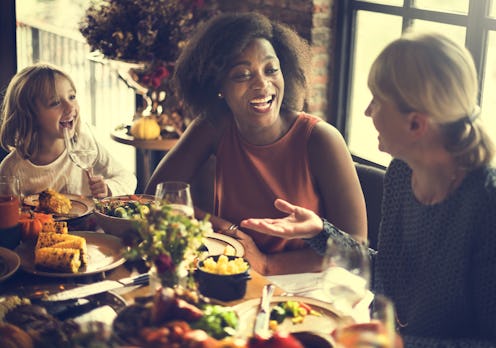Life
Tips For Bringing A Partner Of Different Religious Beliefs Home For The Holidays

Bringing home your partner for the holidays can produce stomach-aching levels of anxiety — and not just because Uncle Rick makes inappropriate jokes sometimes. If you and your partner are different religions, the concerns about melding your traditions in the company of family members can make the situation heightened for both of you. While the two of you might be well versed in each other's respective faiths or observances, family members can be a little more unpredictable. Furthermore, certain holiday practices might conflict with your or your partner's own beliefs. It's important — and respectful to all involved — to go into the situation mindful of everyone's comfort levels and needs. Doing so can help make the situation a really beautiful one.
"The holidays often center on food, faith, and family. It is wonderful to introduce your partner to the traditions that have meaning for your family," Angela Corbo, PhD., associate professor and the chair of Widener University’s Communications Studies department, and a Safe Space Ally, tells Bustle.
As the person inviting your partner into your family traditions, it is essential to communicate with all parties involved. "While your traditions seem reflexive to you, your partner may feel uncomfortable or anxious," Corbo says.
Take a few moments to think about your holiday experience before you arrive there, Corbo says. This can help you prepare your partner for things they might experience. For example, do you attend a religious service? Do you pray before meals? Do you hold hands at the table while your pray? Does your family participate in religious practices in the home, like putting a baby Jesus in the manger or lighting the menorah, celebrating Kwaanza, or singing traditional hymns or song?
"Discuss the traditions and practices with your partner in advance in order to avoid surprises. You can also explain any religious or cultural significance to the practices your family observes," Corbo says.
The conversations that might arise is another thing to consider, as families are often mighty curious about the new person coming into the home, and visa versa. Be there for each other in these situations. It is difficult enough to be grilled by family members, even if gently, and if religion or beliefs come up, it can feel all the more sensitive.
"It is common to 'interview' an outsider by asking about their upbringing," Corbo says, and good intentions to get to know someone and their beliefs can easily come across as insensitive. You can facilitate this introduction by speaking with the family in advance so they can gain a sense of familiarity with your partner, Corbo says, and remember that it is crucial to play an active role in the conversation as your partner tries to respond to your family members.
"Let your partner know who will be at the holiday event and some potential issues that can arise. If you anticipate, 'So, you couldn’t find anyone Jewish?' or 'I just don’t understand how same-sex couples are allowed to marry,' you need to prepare your partner in advance," Corbo says.
Another important thing to consider? Food and beverages. If your partner has any religious restrictions or needs around diet or alcohol consumption, prepare for that. Consider the food options associated with the holidays. You want your partner to feel comfortable with your family and also feel cared for.
And as a guest, Corbo says, it is paramount that you show respect to your partner’s family and traditions. It is possible that you may not practice any faith or believe in the existence of a higher being.
"You can demonstrate inclusion as a guest by observing, participating, or simply not judging something that seems foreign to you," Corbo says.
Social worker Abigale Johnson, who has a private practice in New York, tells Bustle that communication prior to the holidays about what to expect with your partner is central to preparation, a well as educating your family on your partner's religion and traditions.
"You'd be surprised at how people welcome others during the holidays, even when they practice different religions," Johnson says. You might even find yourself creating a mashup of celebrations to honor both religions.
Psychologist Dr. Linda Humphreys, who has a Ph.D. in metaphysical counseling, tells Bustle that a good way to prepare is to be creative about how you share your traditions. It can be really fun to enlighten one another, and to share your hopes in celebrating together.
"Each share stories about favorite holiday celebrations when you grew up," Humphreys says, and keep a focus on the fun and humorous times in particular. "Share the name of the holiday, what the holiday, represents, how your family celebrated it, your favorite part about the holiday celebration. Sharing funny holiday stories engages the other person in a non-threatening, non-demanding-of-anything manner."
Then, you can each share how you would like to celebrate the holiday together, and how you would like the other person to participate, and what you both feel comfortable with.
Ultimately, you might find a way of celebrating the holidays, and honoring your religions (or absence of religion) that will feel very much your own.
Experts:
Social worker Abigale Johnson, who has a private practice in New York
Psychologist Dr. Linda Humphreys
Angela Corbo, PhD., associate professor and the chair of Widener University’s Communications Studies department